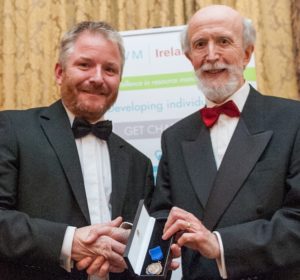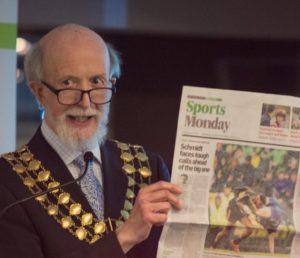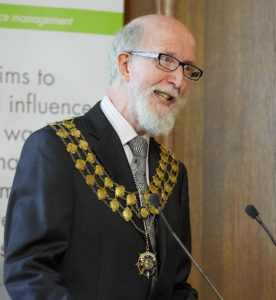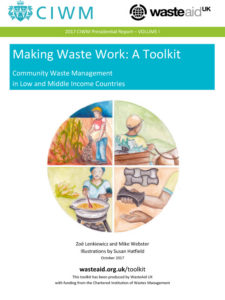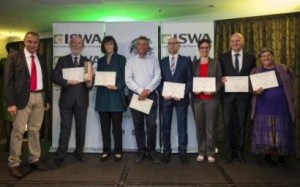The significant potential of better waste and resource management for climate mitigation
ISWA are hosting the first ever Waste and Resources Pavilion at COP28 in Dubai. My contribution is an article, co-authored with the ISWA President Carlos Silva Filho and Technical Director Aditi Ramola, where we challenge the common perception that waste and resource management contributes minimally to mitigation of climate heating.
DCW looks back on his CIWM Presidential year
Professor David C. Wilson’s final contribution to the CIWM Journal took the form of an interview in which he looked back on his Presidential year. This web-posting also includes an index of and links to his monthly columns for the CIWM journal, many of which were ‘think-pieces’ on issues in which he has been involved for years or even decades. Among the questions covered in the final interview were: has any topic dominated the year (yes, plastics – both marine plastics and the ‘China ban’); and what would be your advice to Enda Kiernan and future CIWM Presidents (‘Be true to yourself’ – which the editor also used as this month’s headline).
DCW awards his Presidential Medal
At the CIWM Presidential Dinner at the Intercontinental Hotel in Dublin, after the inauguration of Enda Kiernan as the next President, DCW’s last act as the retiring President was to award his CIWM Presidential Medal for 2018. The recipient was Mike Webster, the founder and CEO of the new charity Wasteaid, which is working directly with local communities in some of the least developed countries to tackle the global waste crisis. The text of DCW’s speech is reproduced below.
DCW hands over the CIWM Presidency
Professor David C Wilson handed over the Presidency of CIWM, the UK and Irish professional body for resources and waste, to Enda Kiernan at the Aviva Stadium in Dublin on 13 November 2018. He highlighted plastics – both plastics entering the oceans and China’s ban on imports for recycling – as the dominant topic in his Presidential year. The public focus on marine plastics also helped dissemination of his Presidential report, the CIWM-Wasteaid Toolkit Making Waste Work; the website clocked 56,000 visits in its first year, with 7,000 downloads. DCW introduced his fellow Irishman, Enda Kiernan of Cork County Council as the next President. CIWM waited more than a century for its first Irish President; now we have had three in five years, and two in a row, although Enda is the first from the Republic of Ireland.
Plastics – diabolic or fantastic?
In his October column for the CIWM Journal, Professor David C Wilson reflects on the dominant story of his CIWM Presidential year, how we respond to the crisis of plastics entering our oceans. Which plastic uses are diabolic and should be banned, and which do we really need? One of his starting points was a recent CIWM-sponsored report which proposed a five-fold use-based categorisation of plastics. The other was the July Klosters Forum, which gathered 60 stakeholders from around the World to brainstorm on how to stem the flow of plastics into the oceans.
Tackling the global waste crisis through community waste management
Three billion people lack access to basic solid waste management services; addressing this problem would not only vastly improve their lives but also halve the weight of plastics entering the oceans. Professor David C Wilson and Mike Webster of Wasteaid made the case earlier this year, in an open access editorial in the ISWA journal Waste Management & Research, for community waste management as a ‘bottom up’ approach, to run in parallel to traditional ‘top-down’ approaches led by donors and governments. Community waste management requires building capacity at the local level. This is underpinned both by practical guidance, provided by the 2017 CIWM-Wasteaid Toolkit Making Waste Work; and by scientific understanding of the simple technologies in the toolkit. With our colleagues at Imperial College London, we have this month published a paper on optimising the technology for producing plastic bonded sand blocks from the low value LDPE film plastic, which is a major problem even in the least-developed countries.
Charge! – Paying for household waste services
CIWM President and lifelong waste policy and planning consultant David C Wilson reflects in his September column for the CIWM Journal on the challenges of devising the right policies to charge households for solid waste management services. Of course, we already pay for our solid waste services, but that charge is usually hidden within a wider charge or tax, which in the UK is council tax. Across Europe, many local authorities have been experimenting over the last 20 years with pay-as-you-throw (PAYT) systems, where the charge varies at least in part according to usage. The growing evidence base suggests that PAYT does work, in terms of reducing waste quantities and increasing recycling. But why should local authorities, and ultimately households, pay for all the costs of municipal solid waste management? Particularly in the context of Defra’s forthcoming Resources and Waste Strategy for England, DCW argues for real Extended Producer Responsibility (EPR), with teeth, that will move the full financial burden of collecting, recycling and disposing of packaging and other products in the municipal waste stream from local authorities to the producers and supply chain. If we cannot have PAYT, let us at least have PAYB (pay-as-you-buy).
DCW wins 2024 ISWA Publication Award
DCW won the 2024 ISWA Publication Award for his magnum opus, looking back over his long career at the evolution of waste and resource management since the first environmental control legislation in the 1970s, and reflecting on current and future priorities.
DCW awards his Presidential Medal
DCW awarded his CIWM Presidential Medal for 2018 to Mike Webster, the founder and CEO of the new charity Wasteaid, which is working directly with local communities to tackle the global waste crisis.
DCW hands over CIWM Presidency
DCW handed over to Enda Kiernan at the Aviva Stadium in Dublin on 13th November 2018. The Gaelic Football team which Enda manages appeared in the lead photo story of the previous day’s Irish Times.
DCW inaugurated as CIWM President
Professor David C Wilson giving his inauguration speech as CIWM President 2017 at Church House Westminster in October 2017. His theme for the year was solid waste management as the forgotten utility service, underpinning modern society.
DCW’s CIWM Presidential Report 2017
DCW commissioned WasteAid UK to prepare a practical toolkit for poor communities on how to make useful products from the low-value plastics and organics in their waste. In its first year, the website was visited 56,000 times, with 7,000 downloads of the toolkit.
ISWA Publication Award 2015
DCW with co-authors Ljiljana Rodic, Andy Whiteman, Costas Velis, Barbara Oelz, Joachim Stretz and Anne Scheinberg, receiving the Award from ISWA Scientific and Technical Committee Chair Antonis Mavropoulos (left), at the ISWA 2015 World Congress in Antwerp on Tuesday 08 September.

